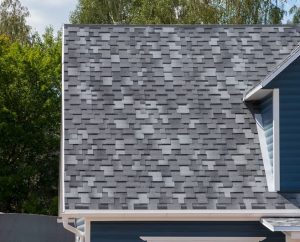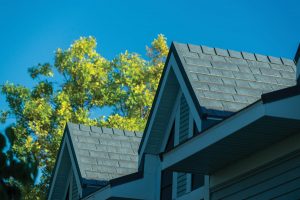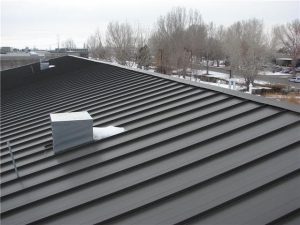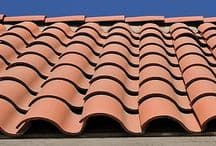Which Residential Roof Type Is Best For You?
As a homeowner, when you are exploring what type of roof you want to install on your home, there is a lot to consider. Some questions we get all the time include:
- Should I get asphalt roof shingles?
- What about slate roofs or concrete tiles? Slate tiles?
- And how should the roof design look?
Whether you’re mulling a roof for a new home, an existing roof repair or a complete roof replacement, determining the roofing tiles and design is your first step.
Working with professional contractors is the first step toward understanding your roofing options and finding the best fit. At Wildwood, we’ll walk you through the roof styles that fit your home and design a roofing system that matches your vision.
Before that, it’s a good idea to get familiar with some of the roofer vernacular you’ll encounter.
Types of Roofing
There are five common types of residential roofs that you should consider when mulling a new roof or retro-fit.
Asphalt Shingles
The most common residential roofing material used in the United States are asphalt shingles, and for a good reason. These shingles have been around since 1903 have stood the test of time as one of the most reliable types of roofing material.

Relatively inexpensive up-front cost and is relatively simple to install
Asphalt shingles usually last up to 20 years or more on an average home. They are particularly useful in an area like St. Louis, where weather isn’t as radical as somewhere like Florida.
They consist of two different types of base materials – organic and fiberglass. This unique design helps them reflect sunlight away from home, helping reduce air conditioning costs during the hot summer months. They are also resistant to wind and hail damage while providing additional waterproofing support for your home.
In addition to their cost-effective nature and durability, asphalt shingles come in a wide variety of colors and styles.
Slate Shingles
Slate shingles are a sophisticated and upscale type of roofing material. They are made from concrete, providing your home with resistance to rot and fire. They are incredibly easy to maintain and have a life expectancy of 100 years.

While these are incredibly durable and give off a natural appearance, they come with their own unique set of disadvantages, too. The weight of slate shingles and the cost associated with them means they require a high degree of expertise for installation.
Slate shingles are also susceptible to damage when you walk on them, making maintenance and gutter cleaning a pain.
Because of these drawbacks, slate shingles aren’t widespread in the Midwest. Instead, they see far more usage on the East Coast (although they do make appearances in states like Arkansas and Kentucky).
Wood Shakes
Cedar shake roofs use wood shingles made from split logs. Since they are mostly wood, and because every shingle is of slightly varying size, they have a very distinct and natural look to them.
These roofing materials have been around since the colonial era for a lot of reasons. For one, they can withstand harsh weather conditions, keeping UV rays out of the home, which reduces air conditioning costs. This energy efficiency makes them highly effective in areas with lots of sunlight.
Additionally, wood shakes are incredibly eco-friendly materials. The insulation they provide will help cut down on energy costs. Not only are they made from wooded material, but they also produce a minimal impact on the quality of water runoff.
While fire-resistance is a concern, many manufacturers apply a fire-resistant coating to them for extra safety.
There are many advantages to wood shakes, but they also require expertise to install. As such, they are a bit more expensive than an asphalt shingle roof, but its durability and energy efficiency are enough for many homeowners to pull the trigger.
Metal Roofing
Metal roofing has been a growing trend recently. The market share for metal roofs quadrupled over the past decade. Metal shingles are low maintenance, lightweight, and environmentally friendly, giving them a ton of upside. 
They’ve also proven to be quite durable. The average life of a metal shingle roof is 50+ years, meaning your investment in them will last a long time relative to other roofing types.
While there is some benefit, the installation can be tricky, so it’s essential to partner with a roofing contractor who understands metal shingles very well.
Clay Tiles
Roofing material manufacturers produce clay tiles by baking molded clay. They can change the amount of time and temperature they heat the clay at to create a range of thickness and textures. In addition to coming in a variety of sizes and shapes, clay tiles are typically available from shades of white, yellow, orange, and brown.

These ceramic roof tiles are generally durable. They’re resistant to fading and are fireproofed, plus quality tiles should last anywhere between 50 to 70 years.
These tiles are more commonly found in the Southwest because they fit in with homes that borrow elements of Spanish architecture.
The tiles hang in parallel rows, overlapping to keep out rainwater.
While they are visually appealing, clay tiles are not suitable for climates with fluctuating weather because they tend to erode. High winds also tend to take their toll on clay tiles over the years, making them somewhat impractical in the greater St. Louis area.
Find the right roof type for your home based on design, function, and price
Now that you’ve got a feel for the different kinds of roofing available to you, you can start to narrow down your choices. At this stage, you should consult with a professional roofing contractor.
In addition to providing long-lasting residential roofing services, an experienced residential roofing contractor will help you identify which of these five types of roofing are best for you based upon three factors: design, function, and price.
Design
Quality roofing can add resale value to your home and add to its curb appeal. Beautiful terra cotta tile roofing can fit one home’s aesthetic, while the rustic charm of cedar shakes might fit another’s. Or perhaps slate roofing is more of your style. Whatever your tastes, a roofing contractor will be able to walk you through choices that satisfy them.
Function
Roofing, of course, is supposed to protect your home from the sun, rain, and temperature. Good roofing performs, even in high wind areas, with the highest temperature variance like St. Louis. There are framing, underlayment, and installation techniques to help a roofing system perform in even the harshest environmental conditions.
Price
Roofs are typically measured—and priced—in roofing squares, which are about 100 square feet. Metal roofing and asphalt shingles are among the most reasonably priced by roofing squares. You might, however, get a longer run out of a slate or tile roof, which can last for hundreds of years. A roofing contractor will be able to point you toward the right roofing material for your price point.
Trusted St. Louis Roofing Services
Wildwood Roofing & Construction has been completing residential roof repair and commercial roofing projects for years, and we are proud of each of our roof restoration projects. We know that every St. Louis roof repair project is different, which is why we have years of experience providing our clients with an in-depth and free estimate. Our licensed estimator will provide you with an honest and accurate quote for your residential or commercial roofing repair or replacement.
Wildwood Roofing & Construction has built its reputation by focusing on developing three key traits:
- Technique
- Experience
- Customer Service
We proudly service Saint Louis and the surrounding area – including O’Fallon, Wildwood, Chesterfield, Ellisville, Maryland Heights, Webster Groves, Ballwin, Fenton, and southern Illinois – with these three principles guiding our every move. Taken together, they create a trifecta of customer satisfaction that many St. Louis roofing companies cannot compete with.
Contact us today for a free, no-pressure roof inspection. We’ll guide you through exactly what’s needed to make your roof serviceable again, and work alongside any insurance claims you need assistance with.
We know that every St. Louis roof repair project is different, which is why we have years of experience in providing our clients with an in-depth and free estimate.

